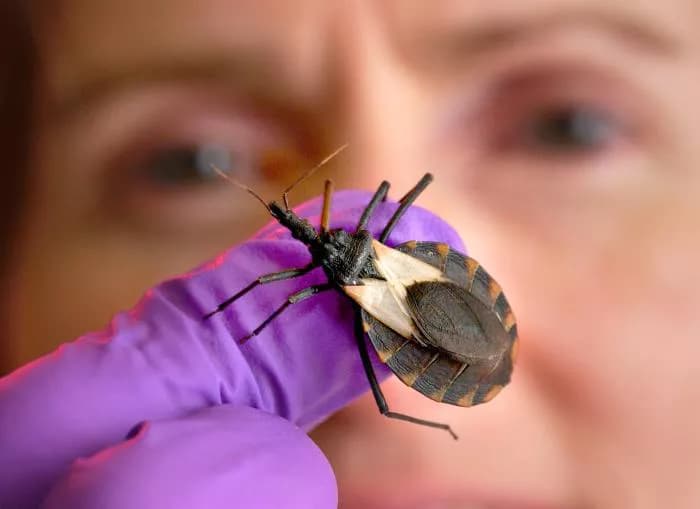What are the other Names for this Condition? (Also known as/Synonyms)
- Chagas Disease
- South American Sleeping Sickness
- Trypanosoma Cruzi Infection
What is American Trypanosomiasis? (Definition/Background Information)
- American Trypanosomiasis, also known as Chagas Disease, is caused by the parasite, Trypanosoma cruzi. This parasite is found only in North and South America, and is highly prevalent in areas of poverty, such as in Latin America
- The infection spreads to humans and animals via the feces of a triatomine bug (also known as “reduviid bug” or “kissing bug”). This insect feeds on the blood of animals and humans and subsequently urinates or defecates on the host, leaving behind T. cruzi parasites
- Infection can occur when urine or feces from the parasites enter the human body, through the eyes, nose, or abrasions on skin. A parasitic transmission of Trypanosoma cruzi can lead to the acute, latent, or chronic phase of the disease, potentially causing permanent damage when left untreated
- While some infected individuals may go through their entire lives without showing any symptom of American Trypanosomiasis, about 20-30% of those infected can develop serious signs, such as cardiac or digestive system problems
- American Trypanosomiasis is treated using anti-parasitic medication. However, most treatments for chronic American Trypanosomiasis involve alleviating symptoms including visits to heart, gastrointestinal tract, or infectious diseases specialists
- The prognosis for the disease is determined by whether an individual has an acute or chronic phase of infection. The outcome is generally positive for those with acute phase infection
Who gets American Trypanosomiasis? (Age and Sex Distribution)
- Individuals of all ages, races, ethnic groups, and both genders are susceptible to American Trypanosomiasis. However, a diagnosis of the infection is more prevalent in children
- Individuals, who live in or regularly visit rural areas of the Americas, are more likely to encounter the triatomine bug
- People in rural areas of Mexico, Central America and South America seem to have the highest risk of being infected with the parasite, as triatomine bugs are quite common in these regions
- In the United States, indigenous transmission of American Trypanosomiasis is very rare
What are the Risk Factors of American Trypanosomiasis? (Predisposing Factors)
The following are the risk factors for American Trypanosomiasis:
- Living in poor, rural areas of low-quality housing where the triatomine bug flourishes
- Working in a laboratory with exposure to the parasite
- Infection may be transmitted during a blood transfusion or organ transplant
It is important to note that having a risk factor does not mean that one will get the condition. A risk factor increases one’s chances of getting a condition compared to an individual without the risk factors. Some risk factors are more important than others.
Also, not having a risk factor does not mean that an individual will not get the condition. It is always important to discuss the effect of risk factors with your healthcare provider.
What are the Causes of American Trypanosomiasis? (Etiology)
- The cause of American Trypanosomiasis is the transmission of triatomine bug feces to animals and humans. The feces contain T. cruzi parasites that can enter the human body through cuts on the skin or orifices of the body
- Other causes of infection include:
- Transmission from a mother to her child in utero
- Blood transfusions or organ transplants from infected donors
- Consuming contaminated food or drink; though, this is a rare possibility
- Transmission through breast milk; though, this is also extremely rare
What are the Signs and Symptoms of American Trypanosomiasis?
The signs and symptoms of American Trypanosomiasis may vary between affected individuals and between different stages of the disease.
Acute American Trypanosomiasis is a sudden illness that can last for multiple weeks or months. The symptoms may be mild and may include:
- Fever and fatigue
- Rash
- Swelling around the site of infection on the skin
- Swelling around the eye, if it is the site of infection, a condition also termed as “Romaña’s sign”
- Diarrhea, vomiting, and anorexia
- Rarely, inflammation of the heart, brain, and lining around the brain (meningitis)
The latent phase American Trypanosomiasis occurs if the acute phase is left untreated.
- Symptoms are typically absent during this period
- In some, it may last anywhere between 10-30 years
- Only about 30% of latent phase cases progress to chronic American Trypanosomiasis
Chronic American Trypanosomiasis can occur many years, or even decades, after the initial infection. The signs and symptoms of chronic infection may include:
- Heart palpitations that can result in heart failure and ultimately death
- Chest pain
- Difficulty breathing
- Chagas cardiomyopathy, due to a dilated heart that is inefficient at pumping blood
- Dizziness
- Temporary loss of consciousness from low blood pressure
- Dilated esophagus or colon, resulting in eating or defecating issues
- Regurgitation and difficulty swallowing
- Constipation
How is American Trypanosomiasis Diagnosed?
The diagnosis of American Trypanosomiasis may be difficult, as parasites are not always detectable in blood at every stage of the disease. The diagnosis of the disease is made by the following tests and exams:
- A thorough physical examination and an assessment of symptoms
- An evaluation of the affected individual’s medical history and region of residence or travel
- Requesting microscopy staining of blood smears to determine the presence of the parasite
- Acute American Trypanosomiasis is the only phase that is detectable using this method, as parasites may be present in the blood circulatory system during this stage
- In latent and chronic American Trypanosomiasis, no parasites are typically found in blood (unless accompanied by a suppressed immune system, such as AIDS)
- Serological tests for antibodies to the parasite are the standard for diagnosis of latent and chronic American Trypanosomiasis. At least 2 tests are required for diagnosis, as false positives for these tests are common. Tests used for these diagnoses include:
- Enzyme-linked immunosorbent assay (ELISA, which is commonly used to detect HIV)
- Immunofluorescent antibody test (IFA)
- A 12 lead electrocardiogram, physical examination, and exercise testing can be used to test for cardiac abnormalities associated with chronic American Trypanosomiasis
- Additionally, contrast studies, abdominal X-rays, and upper endoscopies can be used to observe any enlargements of the esophagus or colon
Many clinical conditions may have similar signs and symptoms. Your healthcare provider may perform additional tests to rule out other clinical conditions to arrive at a definitive diagnosis.
What are the possible Complications of American Trypanosomiasis?
The potential complications for American Trypanosomiasis include the following:
- Progression of the infection from acute to chronic condition, if left untreated or if treatment fails. This may result in heart palpitations and other heart abnormalities, leading to inefficient blood pumping
- Difficulties with eating or passing stools due to dilated esophagus or colon, respectively
- Undesirable side effects from anti-parasitic medications used to treat the disease. Common side effects, that increase in frequency and intensity with age, may include:
- Allergic dermatitis
- Anorexia and weight loss
- Insomnia
- Nausea and vomiting
- Headache, dizziness, or vertigo
- Damaged nerves
How is American Trypanosomiasis Treated?
Treatment is recommended for all adults and children with American Trypanosomiasis, for acute, congenital, and chronic infections. Both healthy and immune-compromised individuals infected with the parasite may benefit from treatment.
The treatment measures may include:
- Prescription anti-parasitic medications, such as benznidazole and nifurtimox (frequently recommended for acute phase infections), in areas where Chagas Disease is prevalent
- A healthcare provider may recommend suitable medication for treatment of the infection
- Medications can be used to kill the parasite in acute infection
- Medications may not cure chronic American Trypanosomiasis, but may help slow progression of the disease, reducing the possibility of complications
- For individuals with symptoms involving the heart or GI tract, seeking medical attention from specialists of the heart, gastrointestinal tract, or infectious diseases
- Insertion of a pacemaker for cardiac arrhythmias
- If the pumping of blood is compromised, heart transplantation may be an option, if deemed necessary by healthcare providers and specialists
- Changes in diet and/or medications for those with symptoms involving the GI tract
- Surgery may be an option, when an individual has severe GI tract symptoms
Note: In the USA, anti-parasitic medication is only available through the CDC.
How can American Trypanosomiasis be Prevented?
American Trypanosomiasis can be prevented by the following measures:
- Improving sanitary conditions in endemic regions (poor regions of the Americas)
- Using insecticides to kill the triatomine bugs
- Screening blood for American Trypanosomiasis, to prevent transmission through blood transfusions or organ transplants
- Detecting American Trypanosomiasis early in a mother to help prevent spread of the infection to the child
- Seeking medical attention to prevent the infection from progressing to the chronic phase
What is the Prognosis of American Trypanosomiasis? (Outcomes/Resolutions)
- The prognosis for American Trypanosomiasis is generally good for those with acute phase of infection, with early diagnosis and prompt treatment
- If left untreated, or if treatment fails, damage to major organs can occur
- It has been reported that approximately 25-30% of individuals with the infection can have severe damage to major internal organs, possibly resulting in death
Additional and Relevant Useful Information for American Trypanosomiasis:
The incubation period for American Trypanosomiasis is about 7-10 days. But, a period of 20-40 days is more common if infection occurs because of a blood transfusion. Most individuals are generally asymptomatic once transmission occurs.
Related Articles
Test Your Knowledge
Asked by users
Related Centers
Related Specialties
Related Physicians
Related Procedures
Related Resources
Join DoveHubs
and connect with fellow professionals



0 Comments
Please log in to post a comment.